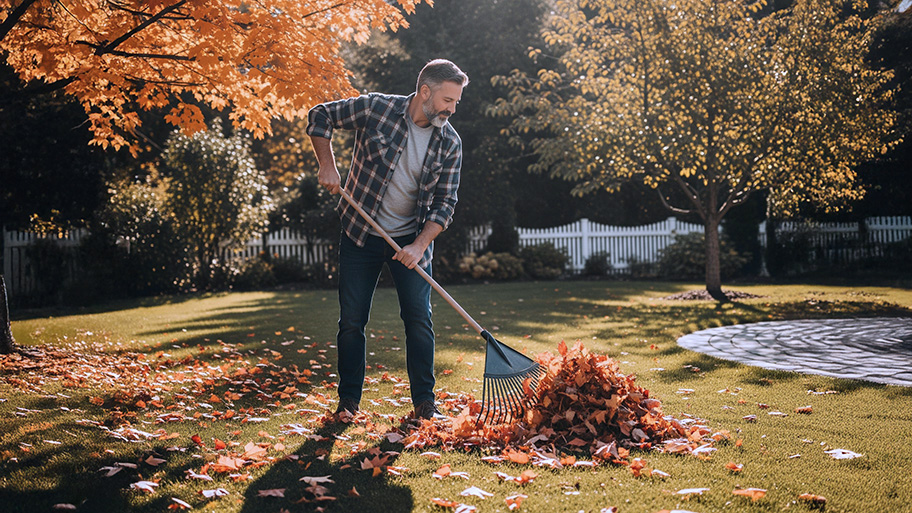
Autumn leaves are beautiful but also leave quite a mess to clean up. This guide will help you budget for your leaf removal cost this fall.
You’re going to need a bigger rake


It’s one thing to have to remove leaves from deciduous trees from your property, but it’s another entirely to pick up and dispose of heavy pine needles that the mower leaves behind. The best way to get rid of pine needles from your lawn is using a leaf blower or sweeper. Plus, there are other tricks you can use to make quick work of your pine needle problem instead of hiring a pro for leaf removal.
In this guide, we’ll explain how to remove pine needles from your lawn to avoid build-up and the harmful acidity they can add to the soil if they break down.
When taking on this project, expect questions only a pro can answer. With our network of local pros, you'll get the job done and your questions answered—without the hassle and stress of doing it yourself.
One of the most efficient leaf cleanup tips to remove pine needles from your lawn is to use a lawn sweeper, a specialized tool designed specifically for removing heavy tree debris like pine needles and pine cones from your grass. A lawn sweeper is a small cart you either push in front of you or tow behind a tractor or mower. When the wheels spin, it activates brush rollers inside that sweep the pine needles and other debris up into a mesh collection bin on the back.
Lawn sweepers are highly effective for removing pine needles from your lawn, and they’re relatively affordable, too. With a built-in collection bag, they make disposing of the tree debris a breeze, as well.
A leaf blower is another good option for collecting pine needles into large piles to make manual cleanup easy. You can use the blower to push the needles into a pile and then use gloves or even a shovel to move the pile into a collection bag. There will still be some manual work involved, but the blower does an excellent job of getting the pine needles out of your grass without damaging the grass.
You can also use a leaf blower around more delicate plants and flowers, but you’ll need to be careful to put it on a low setting so as not to uproot them.

You can use a lawn vacuum to pull pine needles out of your lawn and collect them in a bag for easy disposal. Some companies make standalone lawn vacuums, but you can also use a leaf blower that has a reversible option and a collection bag. The bags are often small, so you’ll have to empty them multiple times if you have a lot of pine needles to pick up.
A lawn vacuum is ideal for targeted removal around delicate flowers and plants, so if you’re removing pine needles from your lawn and garden beds, this might be your best option.
If you have a shop vac with a long attachment that spreads the suction across the ground, you can try using it in place of a standalone lawn vacuum or reversible leaf blower. Since shop vacs aren’t very portable, this will take you longer, but it might be worth trying before going out and spending money on specialized equipment. Just be sure to remove the filter, as the pine needles will quickly clog it, especially if wet.
Finally, the most affordable but also most time- and labor-intensive method for removing pine needles from your lawn is to use a special rake designed for pulling out heavier tree debris, like pine needles. These rakes have rigid metal tines positioned close together, so they’re different from the standard metal rakes you see for removing larger leaves and debris. They’re sometimes called “debris rakes” or “steel-tine rakes,” and “Groundskeeper rake” is a popular brand.
Pulling this rake over your lawn while applying some gentle downward pressure should remove most of the pine needles. You can also use it more targeted in garden beds and around flowers and other plants.
Sometimes, it’s worthwhile to call in a professional leaf removal company near you for a fall cleanup or intermittent pine needle removal.
Professionals will usually have one of the more specialized tools mentioned above available, and sometimes they have more powerful mowers that will suck up heavier debris like pine needles and mulch it or collect it in the mower bag for disposal. If this is the case, you’ll likely save on the leaf cleanup cost since it won’t require additional work from your professional.
If you’re looking to save time and effort, this is your best option. You might be able to save some money on your yard cleanup cost by coupling the work with other landscaping jobs, like a comprehensive fall clean-up, mulching, or even regular mowing.
From average costs to expert advice, get all the answers you need to get your job done.

Autumn leaves are beautiful but also leave quite a mess to clean up. This guide will help you budget for your leaf removal cost this fall.

A yard cleanup can keep your lawn clean and prepare it for the next season. Find out the average yard cleanup cost and what can affect it.

Allowing leaves to decompose naturally can add vital nutrients back into your soil. Learn whether you should rake leaves and why.

A leaf removal service can clear your yard of fallen leaves. Learn why to hire a leaf removal service, what to look for, and how the service works.

Hiring a leaf removal service can save you hours of raking and bagging. Learn what to look for when you hire a leaf removal service.

Leaves are bound to fall, but how long will they stay there? Learn how long it takes for leaves to decompose and how you can speed up the process.